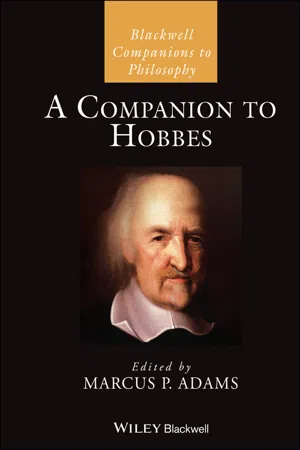
- English
- ePUB (mobile friendly)
- Available on iOS & Android
A Companion to Hobbes
About This Book
Offers comprehensive treatment of Thomas Hobbes's thought, providing readers withdifferent ways of understanding Hobbes as a systematic philosopher
As one of the founders of modern political philosophy, Thomas Hobbes is best known forhisideasregarding the nature of legitimate government and the necessity of society submitting to the absolute authority of sovereign power. Yet Hobbesproduced a wide range of writings, from translations of texts by Homer and Thucydides, to interpretations of Biblical books, to works devoted togeometry, optics, morality, and religion.Hobbes viewed himself aspresentingaunified method for theoretical and practical science—an interconnectedsystem of philosophythat providesmany entry points into his thought.
A Companion to Hobbes isanexpertly curatedcollection of essaysoffering close textualengagementwiththe thought of Thomas Hobbesin his major workswhile probinghisideasregarding natural philosophy, mathematics, human nature, civil philosophy, religion, and more.TheCompaniondiscusses theways in which scholars have tried to understand the unity and diversity ofHobbes's philosophical systemandexamines the reception ofthe different parts ofHobbes'sphilosophybythinkerssuch asRené Descartes, Margaret Cavendish, David Hume, and Immanuel Kant.Presenting a diversity of freshperspectivesbybothemerging and established scholars, thisvolume:
- Provides a comprehensive treatment of Hobbes's thought in his works, includingElements of Law, Elements of Philosophy, andLeviathan
- Explores the connecting points between Hobbes'metaphysics, epistemology, mathematics, natural philosophy, morality, and civil philosophy
- Offers readers strategies for understanding how the parts of Hobbes'sphilosophical systemfit together
- Examines Hobbes's philosophy of mathematicsand hisattempts to understand geometrical objects and definitions
- Considers Hobbes's philosophyin contexts such asthenatural state of humans, gender relations, andmaterialist worldviews
- Challenges conceptions of Hobbes's moral theoryandhis views aboutthe rights of sovereigns
Part of the acclaimed Blackwell Companions to Philosophy series, ACompanion to Hobbes is an invaluable resource for scholarsand advanced students of Early modern thought, particularly those from disciplines such as History of Philosophy, Political Philosophy, Intellectual History, History of Politics, Political Theory, and English.
Frequently asked questions
Information
Part I
First Philosophy, Mathematics, and Natural Philosophy
1
Hobbes’s Unified Method for Scientia
1.1 Method, Science, and Hobbes’s Project
between the rules of religion, that is, the rules of honoring God, which we have from the laws, and the rules of philosophy, that is, the opinions of private men; and to yield what is due to religion to the Holy Scripture, and what is due to philosophy to natural reason. And this I shall do, if I but handle the Elements of Philosophy truly and clearly, as I endeavor to do.(EW I.x–xi)
I intend now, by putting into a clear method the true foundations of natural philosophy, to fright and drive away this metaphysical Empusa; not by skirmish, but by letting in the light upon her.(EW I.xi)
such knowledge of effects or appearances, as we acquire by true ratiocination from the knowledge we have first of their causes or generation: And again of such causes and generations as may be from knowing their first effects.(EW I.2)
every body of which we can conceive any generation, and which we may, by any consideration thereof, compare with other bodies, or which is capable of composition and resolution; that is to say, every body of whose generation or properties we can have any knowledge.(EW I.10)
Table of contents
- Cover
- Blackwell Companions to Philosophy
- Title Page
- Copyright
- Notes on Contributors
- Introduction: The Presentation and Structure of Thomas Hobbes’s Philosophy
- Part I: First Philosophy, Mathematics, and Natural Philosophy
- Part II: Human Nature and Morality
- Part III: Civil Philosophy
- Part IV: Religion
- Part V: Controversies and Reception
- Index
- End User License Agreement